AOD: Legal, Ethical Duties & Application in Community Services
VerifiedAdded on 2023/06/12
|28
|5313
|76
Homework Assignment
AI Summary
This assignment provides a detailed exploration of the legal and ethical obligations that organizations and community workers must adhere to when working with individuals facing alcohol and other drug (AOD) issues. It covers various aspects such as children in the workplace, codes of conduct and practice, discrimination, dignity of risk, duty of care, human rights, informed consent, mandatory reporting, practice standards, privacy and confidentiality, policy frameworks, records management, and work health and safety. The assignment also discusses the rights and responsibilities of employers, workers, and clients under the WH&S Act 2011, along with specific legislation like the Drugs, Poisons and Controlled Substances Act 1981. Furthermore, it examines organizational policies, information collection during intake, funding allocation effects, referral processes, agency roles and target groups, risk assessment processes, and the use of standardized AOD assessment tools like AUDIT, SACS, and DUDIT. The assignment concludes by highlighting key considerations for choosing AOD assessment tools and gathering comprehensive client information to inform the assessment process, including determining the length and level of dependency and established processes for determining a person’s health status. Desklib provides access to this and other solved assignments.
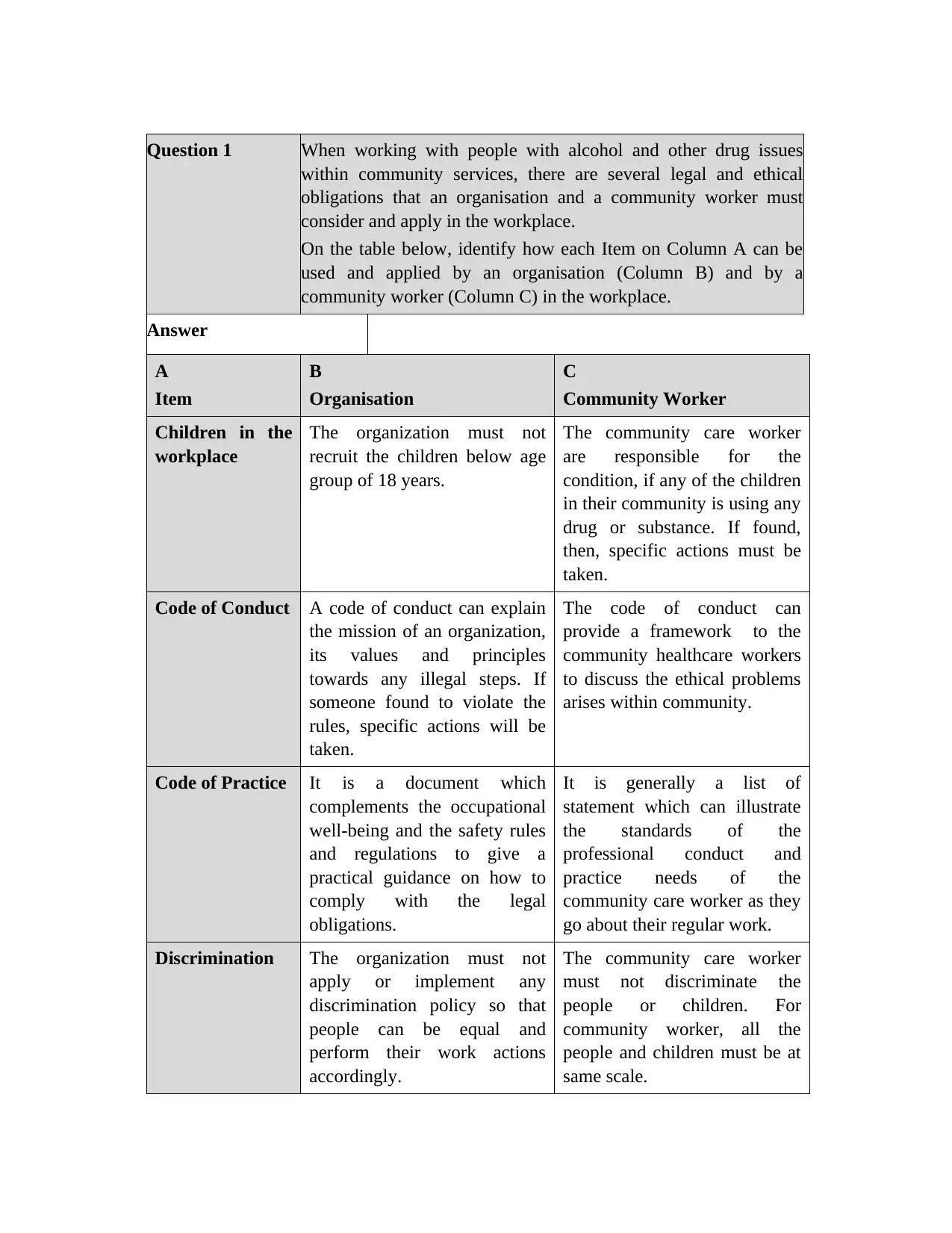
Question 1 When working with people with alcohol and other drug issues
within community services, there are several legal and ethical
obligations that an organisation and a community worker must
consider and apply in the workplace.
On the table below, identify how each Item on Column A can be
used and applied by an organisation (Column B) and by a
community worker (Column C) in the workplace.
Answer
A
Item
B
Organisation
C
Community Worker
Children in the
workplace
The organization must not
recruit the children below age
group of 18 years.
The community care worker
are responsible for the
condition, if any of the children
in their community is using any
drug or substance. If found,
then, specific actions must be
taken.
Code of Conduct A code of conduct can explain
the mission of an organization,
its values and principles
towards any illegal steps. If
someone found to violate the
rules, specific actions will be
taken.
The code of conduct can
provide a framework to the
community healthcare workers
to discuss the ethical problems
arises within community.
Code of Practice It is a document which
complements the occupational
well-being and the safety rules
and regulations to give a
practical guidance on how to
comply with the legal
obligations.
It is generally a list of
statement which can illustrate
the standards of the
professional conduct and
practice needs of the
community care worker as they
go about their regular work.
Discrimination The organization must not
apply or implement any
discrimination policy so that
people can be equal and
perform their work actions
accordingly.
The community care worker
must not discriminate the
people or children. For
community worker, all the
people and children must be at
same scale.
within community services, there are several legal and ethical
obligations that an organisation and a community worker must
consider and apply in the workplace.
On the table below, identify how each Item on Column A can be
used and applied by an organisation (Column B) and by a
community worker (Column C) in the workplace.
Answer
A
Item
B
Organisation
C
Community Worker
Children in the
workplace
The organization must not
recruit the children below age
group of 18 years.
The community care worker
are responsible for the
condition, if any of the children
in their community is using any
drug or substance. If found,
then, specific actions must be
taken.
Code of Conduct A code of conduct can explain
the mission of an organization,
its values and principles
towards any illegal steps. If
someone found to violate the
rules, specific actions will be
taken.
The code of conduct can
provide a framework to the
community healthcare workers
to discuss the ethical problems
arises within community.
Code of Practice It is a document which
complements the occupational
well-being and the safety rules
and regulations to give a
practical guidance on how to
comply with the legal
obligations.
It is generally a list of
statement which can illustrate
the standards of the
professional conduct and
practice needs of the
community care worker as they
go about their regular work.
Discrimination The organization must not
apply or implement any
discrimination policy so that
people can be equal and
perform their work actions
accordingly.
The community care worker
must not discriminate the
people or children. For
community worker, all the
people and children must be at
same scale.
Paraphrase This Document
Need a fresh take? Get an instant paraphrase of this document with our AI Paraphraser
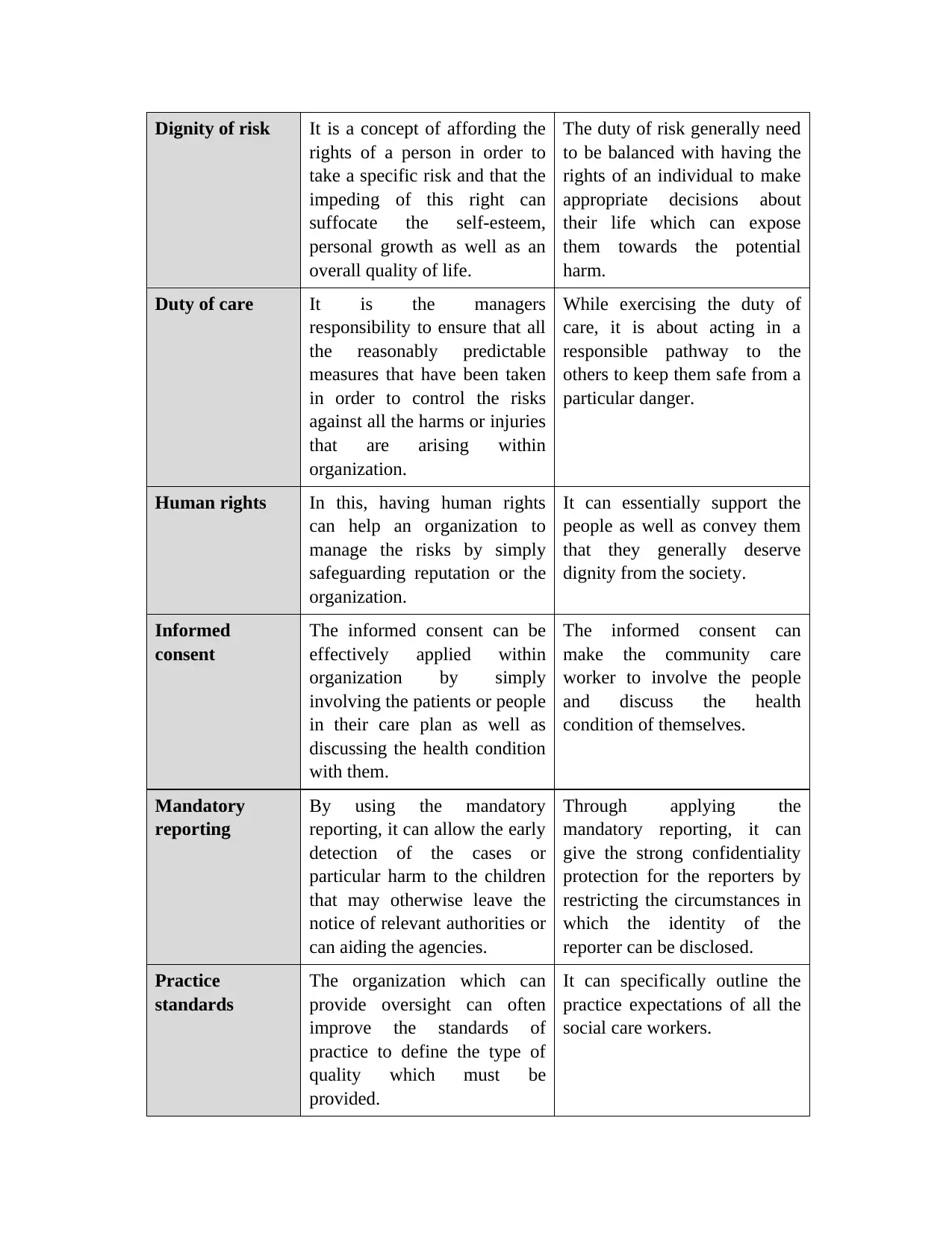
Dignity of risk It is a concept of affording the
rights of a person in order to
take a specific risk and that the
impeding of this right can
suffocate the self-esteem,
personal growth as well as an
overall quality of life.
The duty of risk generally need
to be balanced with having the
rights of an individual to make
appropriate decisions about
their life which can expose
them towards the potential
harm.
Duty of care It is the managers
responsibility to ensure that all
the reasonably predictable
measures that have been taken
in order to control the risks
against all the harms or injuries
that are arising within
organization.
While exercising the duty of
care, it is about acting in a
responsible pathway to the
others to keep them safe from a
particular danger.
Human rights In this, having human rights
can help an organization to
manage the risks by simply
safeguarding reputation or the
organization.
It can essentially support the
people as well as convey them
that they generally deserve
dignity from the society.
Informed
consent
The informed consent can be
effectively applied within
organization by simply
involving the patients or people
in their care plan as well as
discussing the health condition
with them.
The informed consent can
make the community care
worker to involve the people
and discuss the health
condition of themselves.
Mandatory
reporting
By using the mandatory
reporting, it can allow the early
detection of the cases or
particular harm to the children
that may otherwise leave the
notice of relevant authorities or
can aiding the agencies.
Through applying the
mandatory reporting, it can
give the strong confidentiality
protection for the reporters by
restricting the circumstances in
which the identity of the
reporter can be disclosed.
Practice
standards
The organization which can
provide oversight can often
improve the standards of
practice to define the type of
quality which must be
provided.
It can specifically outline the
practice expectations of all the
social care workers.
rights of a person in order to
take a specific risk and that the
impeding of this right can
suffocate the self-esteem,
personal growth as well as an
overall quality of life.
The duty of risk generally need
to be balanced with having the
rights of an individual to make
appropriate decisions about
their life which can expose
them towards the potential
harm.
Duty of care It is the managers
responsibility to ensure that all
the reasonably predictable
measures that have been taken
in order to control the risks
against all the harms or injuries
that are arising within
organization.
While exercising the duty of
care, it is about acting in a
responsible pathway to the
others to keep them safe from a
particular danger.
Human rights In this, having human rights
can help an organization to
manage the risks by simply
safeguarding reputation or the
organization.
It can essentially support the
people as well as convey them
that they generally deserve
dignity from the society.
Informed
consent
The informed consent can be
effectively applied within
organization by simply
involving the patients or people
in their care plan as well as
discussing the health condition
with them.
The informed consent can
make the community care
worker to involve the people
and discuss the health
condition of themselves.
Mandatory
reporting
By using the mandatory
reporting, it can allow the early
detection of the cases or
particular harm to the children
that may otherwise leave the
notice of relevant authorities or
can aiding the agencies.
Through applying the
mandatory reporting, it can
give the strong confidentiality
protection for the reporters by
restricting the circumstances in
which the identity of the
reporter can be disclosed.
Practice
standards
The organization which can
provide oversight can often
improve the standards of
practice to define the type of
quality which must be
provided.
It can specifically outline the
practice expectations of all the
social care workers.
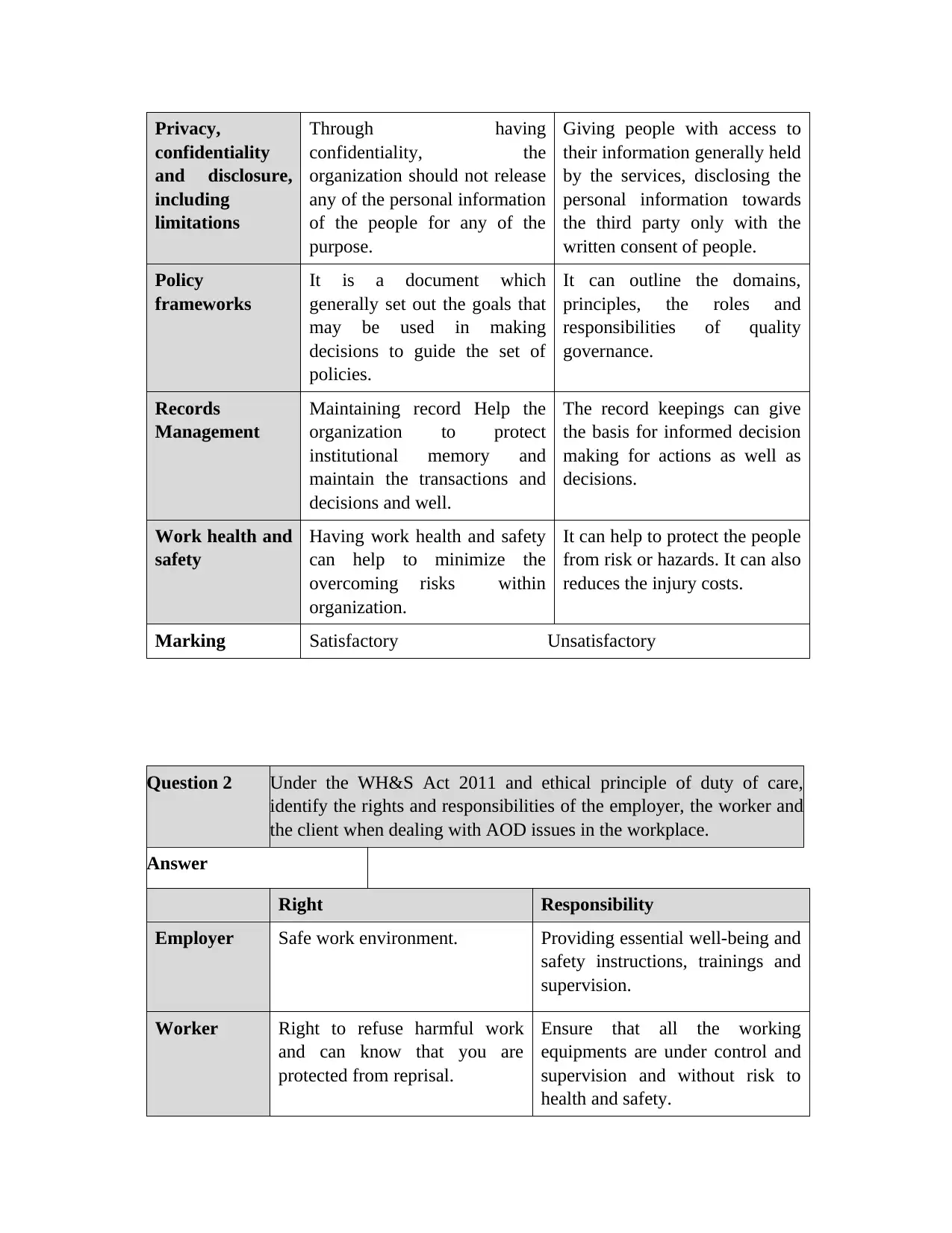
Privacy,
confidentiality
and disclosure,
including
limitations
Through having
confidentiality, the
organization should not release
any of the personal information
of the people for any of the
purpose.
Giving people with access to
their information generally held
by the services, disclosing the
personal information towards
the third party only with the
written consent of people.
Policy
frameworks
It is a document which
generally set out the goals that
may be used in making
decisions to guide the set of
policies.
It can outline the domains,
principles, the roles and
responsibilities of quality
governance.
Records
Management
Maintaining record Help the
organization to protect
institutional memory and
maintain the transactions and
decisions and well.
The record keepings can give
the basis for informed decision
making for actions as well as
decisions.
Work health and
safety
Having work health and safety
can help to minimize the
overcoming risks within
organization.
It can help to protect the people
from risk or hazards. It can also
reduces the injury costs.
Marking Satisfactory Unsatisfactory
Question 2 Under the WH&S Act 2011 and ethical principle of duty of care,
identify the rights and responsibilities of the employer, the worker and
the client when dealing with AOD issues in the workplace.
Answer
Right Responsibility
Employer Safe work environment. Providing essential well-being and
safety instructions, trainings and
supervision.
Worker Right to refuse harmful work
and can know that you are
protected from reprisal.
Ensure that all the working
equipments are under control and
supervision and without risk to
health and safety.
confidentiality
and disclosure,
including
limitations
Through having
confidentiality, the
organization should not release
any of the personal information
of the people for any of the
purpose.
Giving people with access to
their information generally held
by the services, disclosing the
personal information towards
the third party only with the
written consent of people.
Policy
frameworks
It is a document which
generally set out the goals that
may be used in making
decisions to guide the set of
policies.
It can outline the domains,
principles, the roles and
responsibilities of quality
governance.
Records
Management
Maintaining record Help the
organization to protect
institutional memory and
maintain the transactions and
decisions and well.
The record keepings can give
the basis for informed decision
making for actions as well as
decisions.
Work health and
safety
Having work health and safety
can help to minimize the
overcoming risks within
organization.
It can help to protect the people
from risk or hazards. It can also
reduces the injury costs.
Marking Satisfactory Unsatisfactory
Question 2 Under the WH&S Act 2011 and ethical principle of duty of care,
identify the rights and responsibilities of the employer, the worker and
the client when dealing with AOD issues in the workplace.
Answer
Right Responsibility
Employer Safe work environment. Providing essential well-being and
safety instructions, trainings and
supervision.
Worker Right to refuse harmful work
and can know that you are
protected from reprisal.
Ensure that all the working
equipments are under control and
supervision and without risk to
health and safety.
⊘ This is a preview!⊘
Do you want full access?
Subscribe today to unlock all pages.

Trusted by 1+ million students worldwide
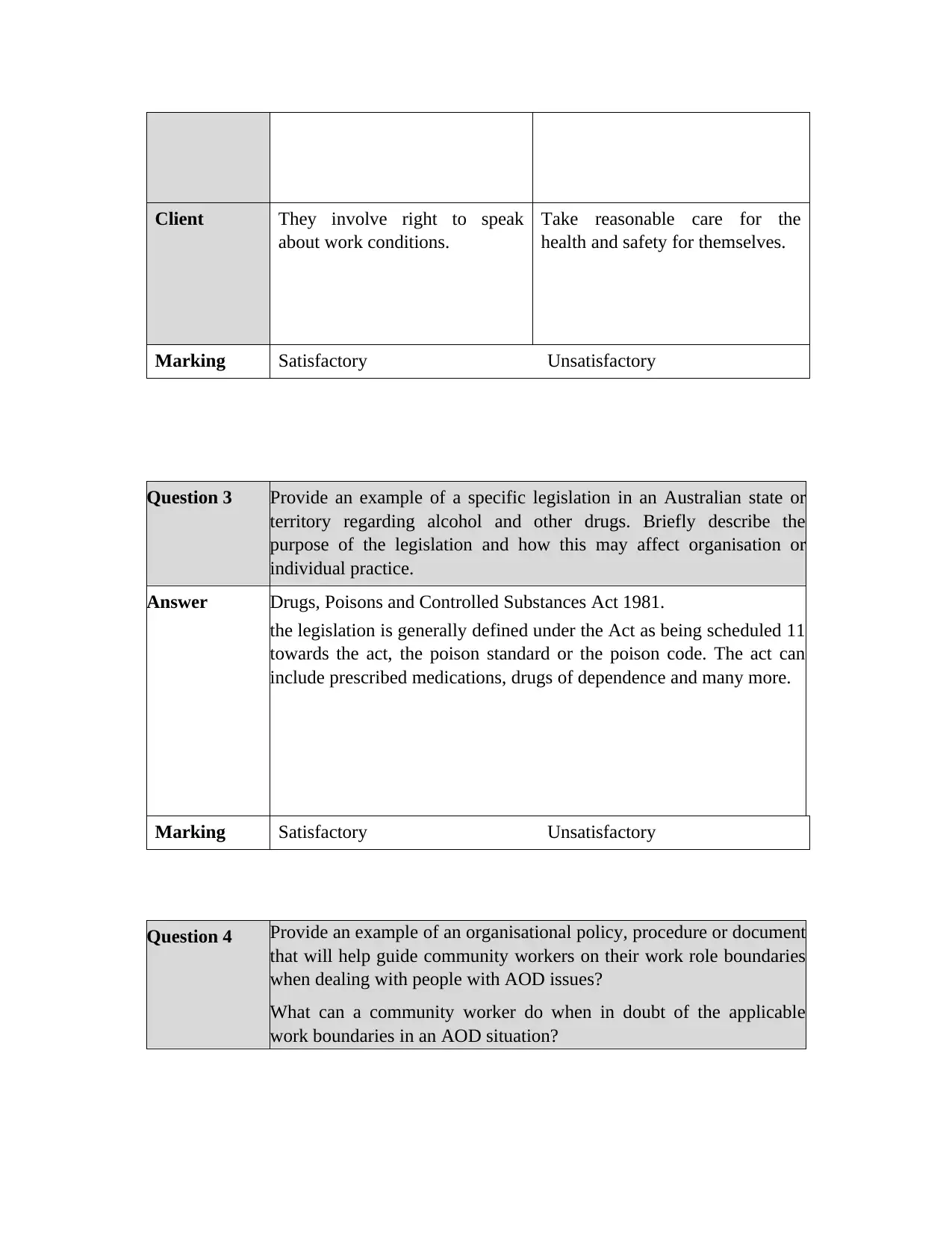
Client They involve right to speak
about work conditions.
Take reasonable care for the
health and safety for themselves.
Marking Satisfactory Unsatisfactory
Question 3 Provide an example of a specific legislation in an Australian state or
territory regarding alcohol and other drugs. Briefly describe the
purpose of the legislation and how this may affect organisation or
individual practice.
Answer Drugs, Poisons and Controlled Substances Act 1981.
the legislation is generally defined under the Act as being scheduled 11
towards the act, the poison standard or the poison code. The act can
include prescribed medications, drugs of dependence and many more.
Marking Satisfactory Unsatisfactory
Question 4 Provide an example of an organisational policy, procedure or document
that will help guide community workers on their work role boundaries
when dealing with people with AOD issues?
What can a community worker do when in doubt of the applicable
work boundaries in an AOD situation?
about work conditions.
Take reasonable care for the
health and safety for themselves.
Marking Satisfactory Unsatisfactory
Question 3 Provide an example of a specific legislation in an Australian state or
territory regarding alcohol and other drugs. Briefly describe the
purpose of the legislation and how this may affect organisation or
individual practice.
Answer Drugs, Poisons and Controlled Substances Act 1981.
the legislation is generally defined under the Act as being scheduled 11
towards the act, the poison standard or the poison code. The act can
include prescribed medications, drugs of dependence and many more.
Marking Satisfactory Unsatisfactory
Question 4 Provide an example of an organisational policy, procedure or document
that will help guide community workers on their work role boundaries
when dealing with people with AOD issues?
What can a community worker do when in doubt of the applicable
work boundaries in an AOD situation?
Paraphrase This Document
Need a fresh take? Get an instant paraphrase of this document with our AI Paraphraser
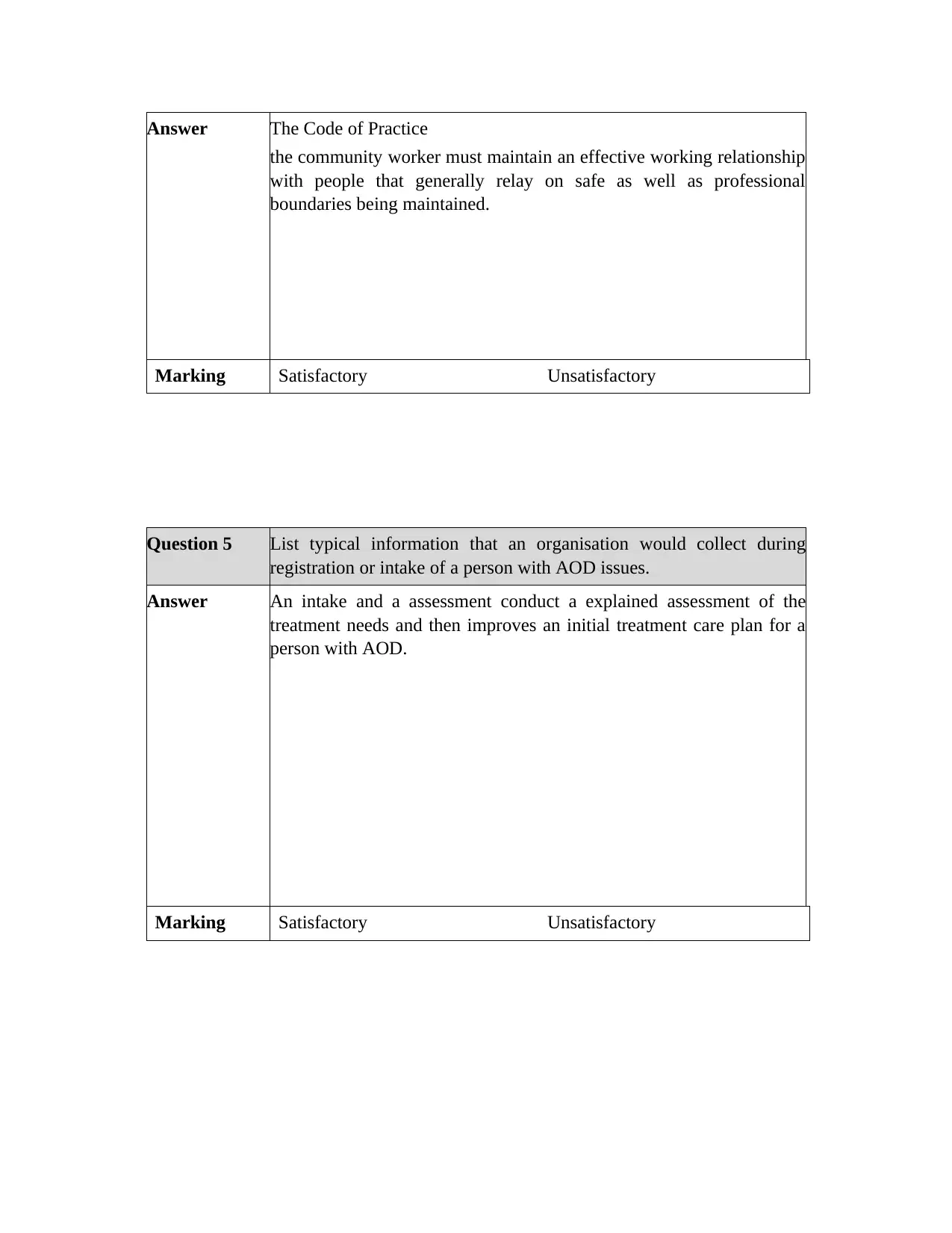
Answer The Code of Practice
the community worker must maintain an effective working relationship
with people that generally relay on safe as well as professional
boundaries being maintained.
Marking Satisfactory Unsatisfactory
Question 5 List typical information that an organisation would collect during
registration or intake of a person with AOD issues.
Answer An intake and a assessment conduct a explained assessment of the
treatment needs and then improves an initial treatment care plan for a
person with AOD.
Marking Satisfactory Unsatisfactory
the community worker must maintain an effective working relationship
with people that generally relay on safe as well as professional
boundaries being maintained.
Marking Satisfactory Unsatisfactory
Question 5 List typical information that an organisation would collect during
registration or intake of a person with AOD issues.
Answer An intake and a assessment conduct a explained assessment of the
treatment needs and then improves an initial treatment care plan for a
person with AOD.
Marking Satisfactory Unsatisfactory
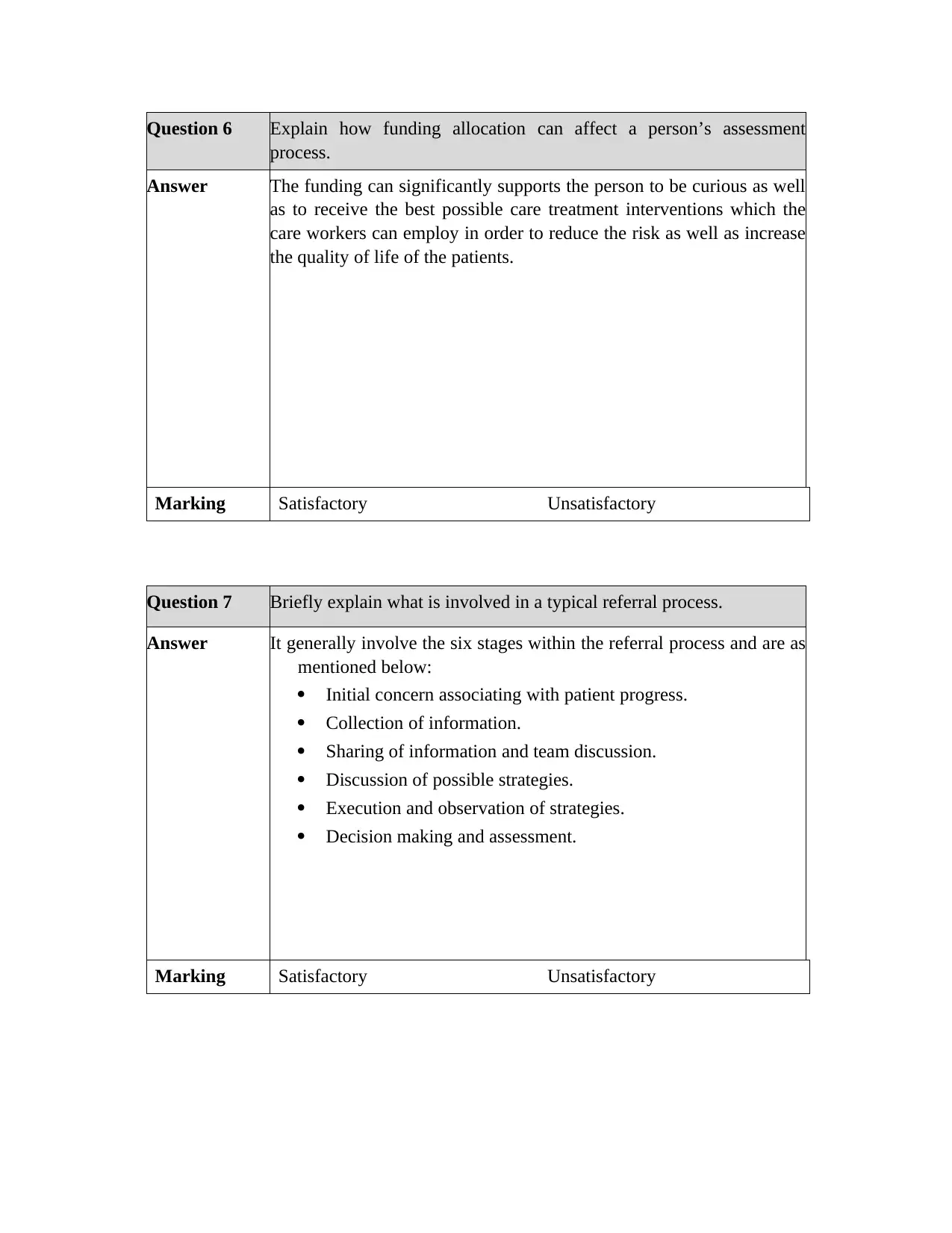
Question 6 Explain how funding allocation can affect a person’s assessment
process.
Answer The funding can significantly supports the person to be curious as well
as to receive the best possible care treatment interventions which the
care workers can employ in order to reduce the risk as well as increase
the quality of life of the patients.
Marking Satisfactory Unsatisfactory
Question 7 Briefly explain what is involved in a typical referral process.
Answer It generally involve the six stages within the referral process and are as
mentioned below:
Initial concern associating with patient progress.
Collection of information.
Sharing of information and team discussion.
Discussion of possible strategies.
Execution and observation of strategies.
Decision making and assessment.
Marking Satisfactory Unsatisfactory
process.
Answer The funding can significantly supports the person to be curious as well
as to receive the best possible care treatment interventions which the
care workers can employ in order to reduce the risk as well as increase
the quality of life of the patients.
Marking Satisfactory Unsatisfactory
Question 7 Briefly explain what is involved in a typical referral process.
Answer It generally involve the six stages within the referral process and are as
mentioned below:
Initial concern associating with patient progress.
Collection of information.
Sharing of information and team discussion.
Discussion of possible strategies.
Execution and observation of strategies.
Decision making and assessment.
Marking Satisfactory Unsatisfactory
⊘ This is a preview!⊘
Do you want full access?
Subscribe today to unlock all pages.

Trusted by 1+ million students worldwide
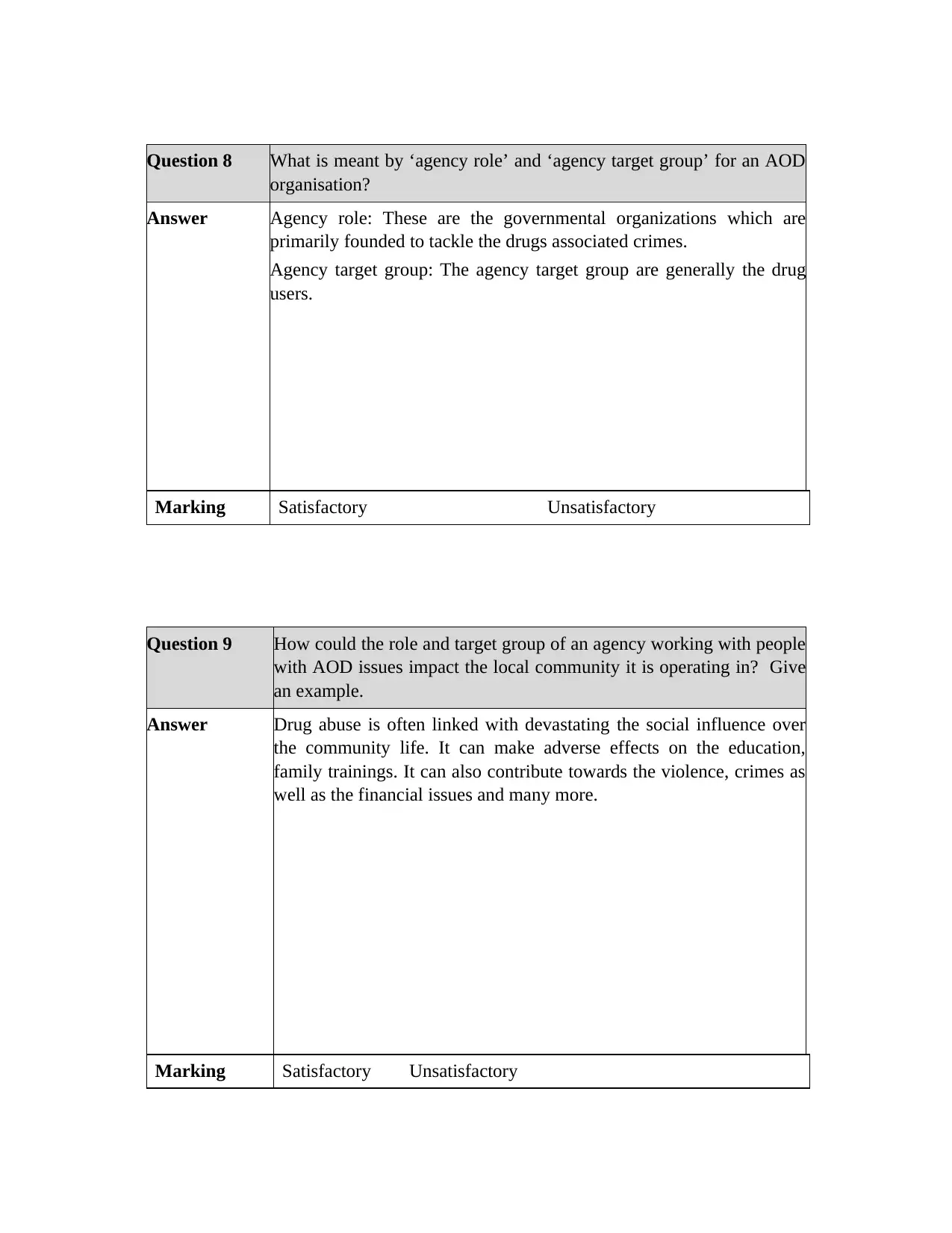
Question 8 What is meant by ‘agency role’ and ‘agency target group’ for an AOD
organisation?
Answer Agency role: These are the governmental organizations which are
primarily founded to tackle the drugs associated crimes.
Agency target group: The agency target group are generally the drug
users.
Marking Satisfactory Unsatisfactory
Question 9 How could the role and target group of an agency working with people
with AOD issues impact the local community it is operating in? Give
an example.
Answer Drug abuse is often linked with devastating the social influence over
the community life. It can make adverse effects on the education,
family trainings. It can also contribute towards the violence, crimes as
well as the financial issues and many more.
Marking Satisfactory Unsatisfactory
organisation?
Answer Agency role: These are the governmental organizations which are
primarily founded to tackle the drugs associated crimes.
Agency target group: The agency target group are generally the drug
users.
Marking Satisfactory Unsatisfactory
Question 9 How could the role and target group of an agency working with people
with AOD issues impact the local community it is operating in? Give
an example.
Answer Drug abuse is often linked with devastating the social influence over
the community life. It can make adverse effects on the education,
family trainings. It can also contribute towards the violence, crimes as
well as the financial issues and many more.
Marking Satisfactory Unsatisfactory
Paraphrase This Document
Need a fresh take? Get an instant paraphrase of this document with our AI Paraphraser
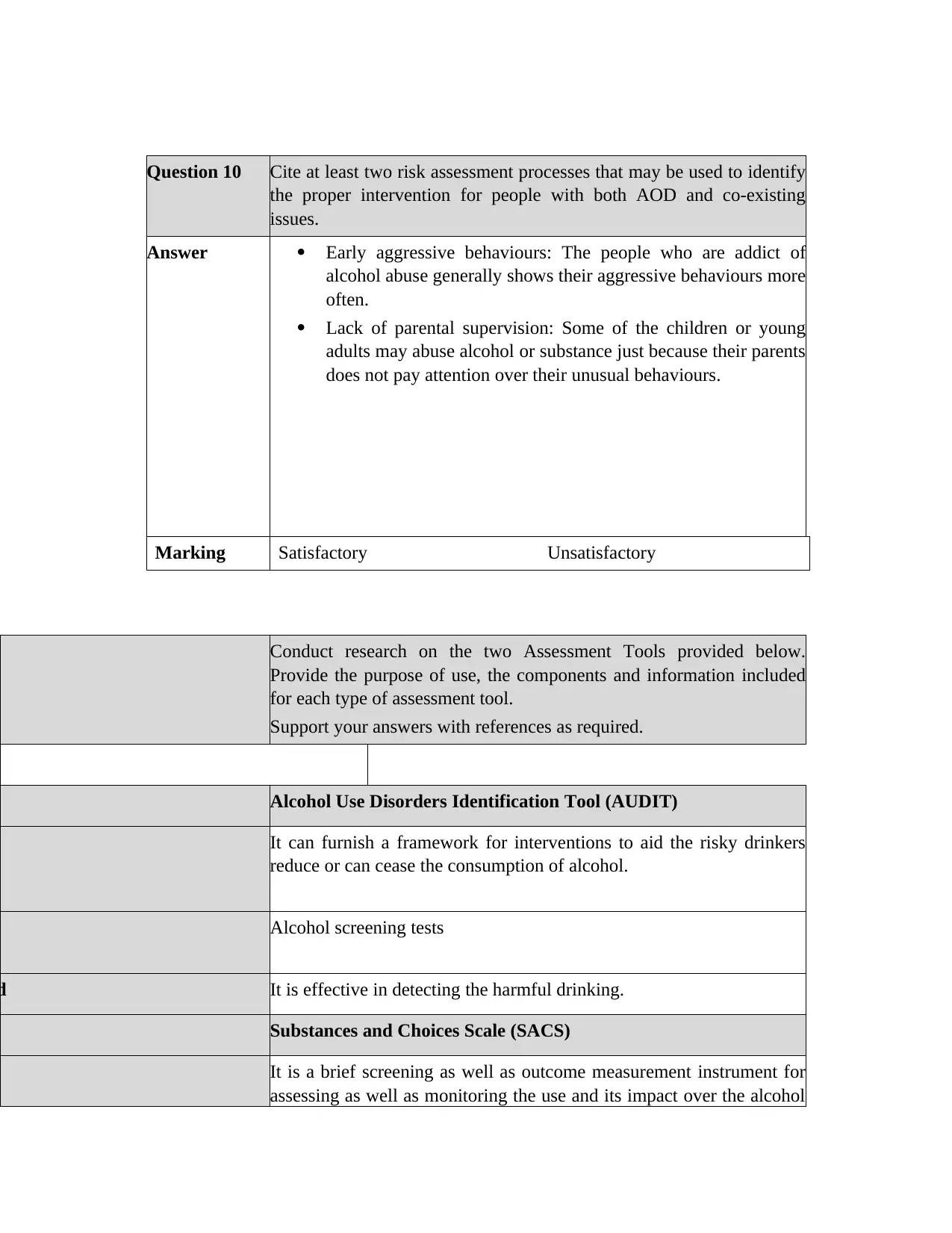
Question 10 Cite at least two risk assessment processes that may be used to identify
the proper intervention for people with both AOD and co-existing
issues.
Answer Early aggressive behaviours: The people who are addict of
alcohol abuse generally shows their aggressive behaviours more
often.
Lack of parental supervision: Some of the children or young
adults may abuse alcohol or substance just because their parents
does not pay attention over their unusual behaviours.
Marking Satisfactory Unsatisfactory
Conduct research on the two Assessment Tools provided below.
Provide the purpose of use, the components and information included
for each type of assessment tool.
Support your answers with references as required.
Alcohol Use Disorders Identification Tool (AUDIT)
It can furnish a framework for interventions to aid the risky drinkers
reduce or can cease the consumption of alcohol.
Alcohol screening tests
d It is effective in detecting the harmful drinking.
Substances and Choices Scale (SACS)
It is a brief screening as well as outcome measurement instrument for
assessing as well as monitoring the use and its impact over the alcohol
the proper intervention for people with both AOD and co-existing
issues.
Answer Early aggressive behaviours: The people who are addict of
alcohol abuse generally shows their aggressive behaviours more
often.
Lack of parental supervision: Some of the children or young
adults may abuse alcohol or substance just because their parents
does not pay attention over their unusual behaviours.
Marking Satisfactory Unsatisfactory
Conduct research on the two Assessment Tools provided below.
Provide the purpose of use, the components and information included
for each type of assessment tool.
Support your answers with references as required.
Alcohol Use Disorders Identification Tool (AUDIT)
It can furnish a framework for interventions to aid the risky drinkers
reduce or can cease the consumption of alcohol.
Alcohol screening tests
d It is effective in detecting the harmful drinking.
Substances and Choices Scale (SACS)
It is a brief screening as well as outcome measurement instrument for
assessing as well as monitoring the use and its impact over the alcohol
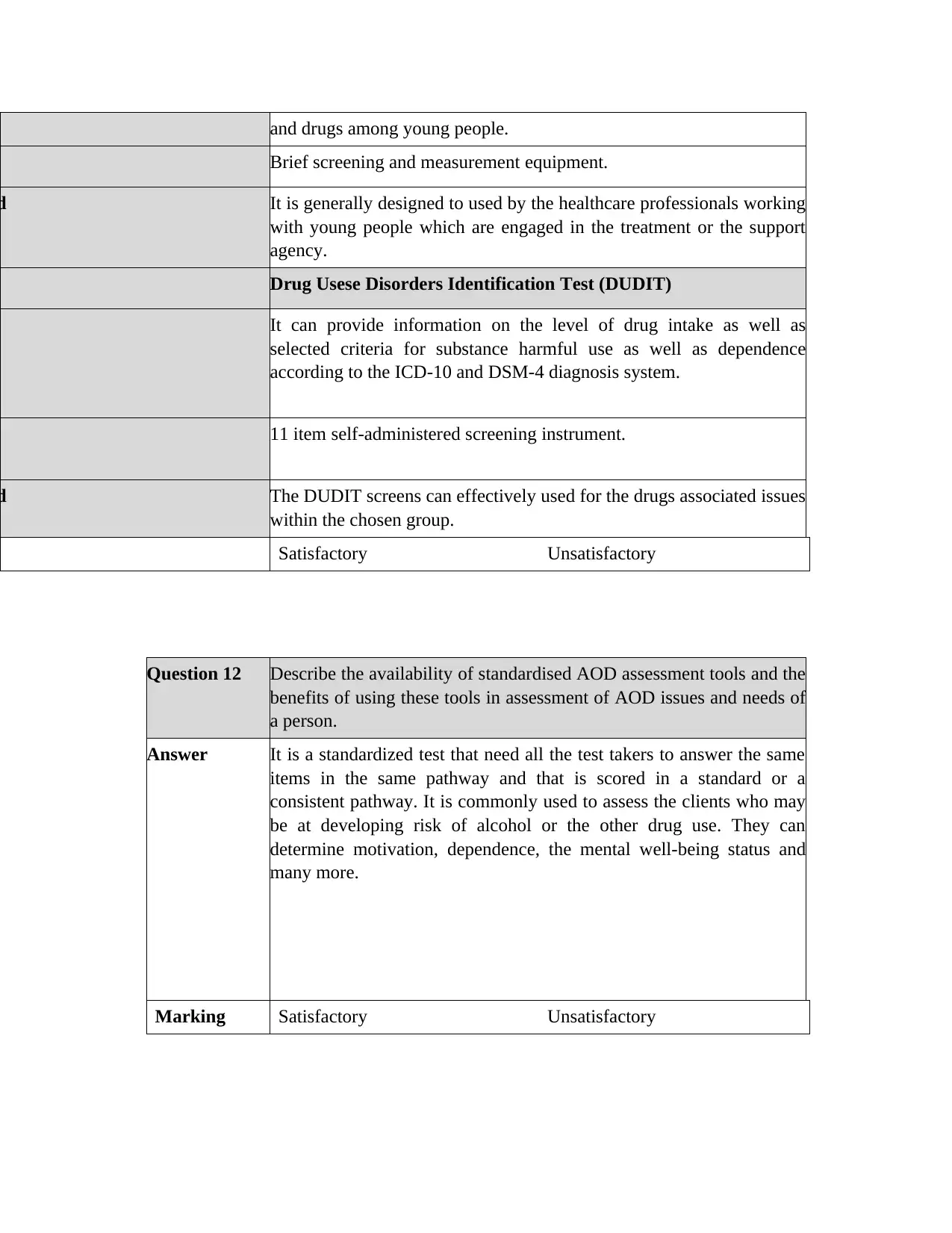
and drugs among young people.
Brief screening and measurement equipment.
d It is generally designed to used by the healthcare professionals working
with young people which are engaged in the treatment or the support
agency.
Drug Usese Disorders Identification Test (DUDIT)
It can provide information on the level of drug intake as well as
selected criteria for substance harmful use as well as dependence
according to the ICD-10 and DSM-4 diagnosis system.
11 item self-administered screening instrument.
d The DUDIT screens can effectively used for the drugs associated issues
within the chosen group.
Satisfactory Unsatisfactory
Question 12 Describe the availability of standardised AOD assessment tools and the
benefits of using these tools in assessment of AOD issues and needs of
a person.
Answer It is a standardized test that need all the test takers to answer the same
items in the same pathway and that is scored in a standard or a
consistent pathway. It is commonly used to assess the clients who may
be at developing risk of alcohol or the other drug use. They can
determine motivation, dependence, the mental well-being status and
many more.
Marking Satisfactory Unsatisfactory
Brief screening and measurement equipment.
d It is generally designed to used by the healthcare professionals working
with young people which are engaged in the treatment or the support
agency.
Drug Usese Disorders Identification Test (DUDIT)
It can provide information on the level of drug intake as well as
selected criteria for substance harmful use as well as dependence
according to the ICD-10 and DSM-4 diagnosis system.
11 item self-administered screening instrument.
d The DUDIT screens can effectively used for the drugs associated issues
within the chosen group.
Satisfactory Unsatisfactory
Question 12 Describe the availability of standardised AOD assessment tools and the
benefits of using these tools in assessment of AOD issues and needs of
a person.
Answer It is a standardized test that need all the test takers to answer the same
items in the same pathway and that is scored in a standard or a
consistent pathway. It is commonly used to assess the clients who may
be at developing risk of alcohol or the other drug use. They can
determine motivation, dependence, the mental well-being status and
many more.
Marking Satisfactory Unsatisfactory
⊘ This is a preview!⊘
Do you want full access?
Subscribe today to unlock all pages.

Trusted by 1+ million students worldwide
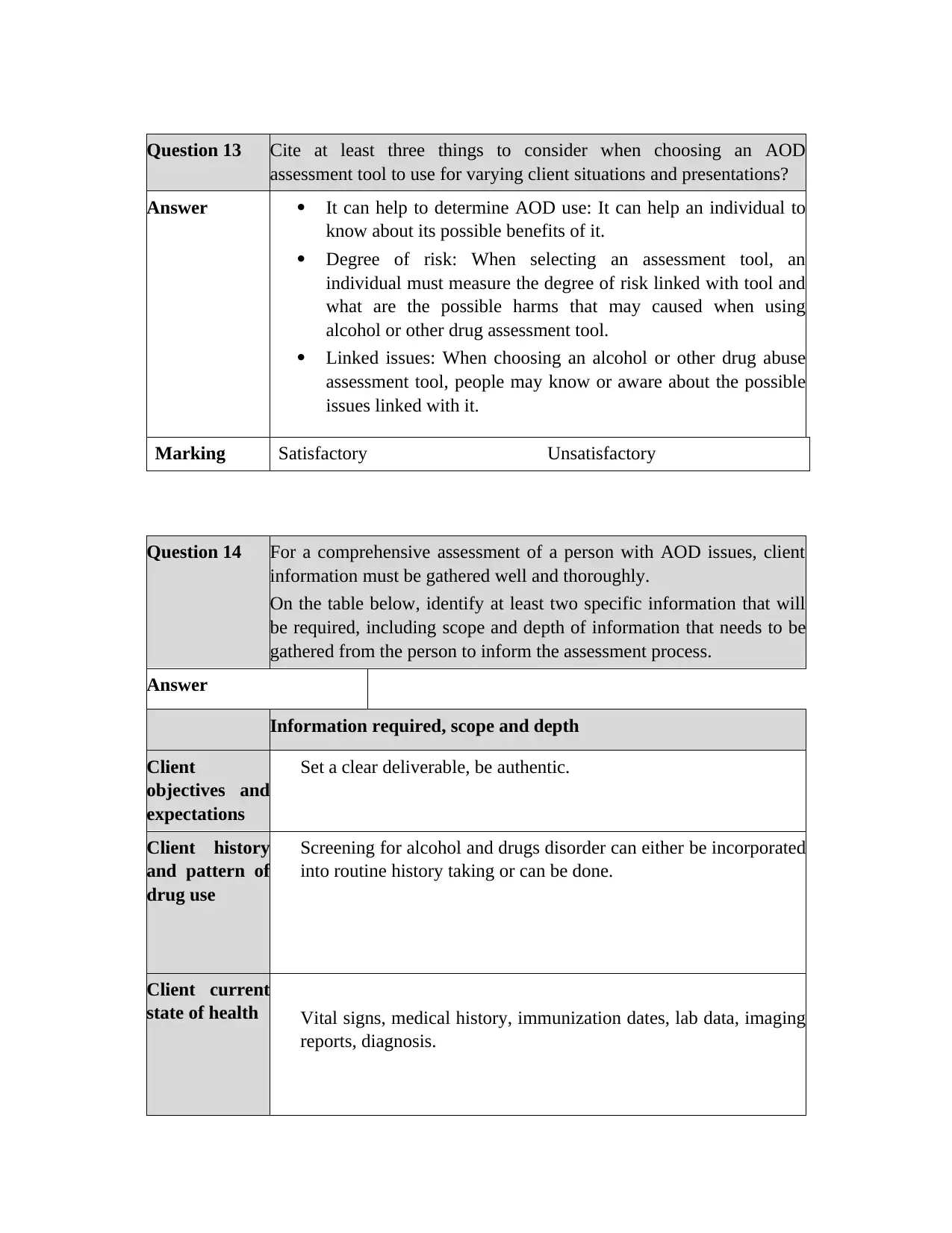
Question 13 Cite at least three things to consider when choosing an AOD
assessment tool to use for varying client situations and presentations?
Answer It can help to determine AOD use: It can help an individual to
know about its possible benefits of it.
Degree of risk: When selecting an assessment tool, an
individual must measure the degree of risk linked with tool and
what are the possible harms that may caused when using
alcohol or other drug assessment tool.
Linked issues: When choosing an alcohol or other drug abuse
assessment tool, people may know or aware about the possible
issues linked with it.
Marking Satisfactory Unsatisfactory
Question 14 For a comprehensive assessment of a person with AOD issues, client
information must be gathered well and thoroughly.
On the table below, identify at least two specific information that will
be required, including scope and depth of information that needs to be
gathered from the person to inform the assessment process.
Answer
Information required, scope and depth
Client
objectives and
expectations
Set a clear deliverable, be authentic.
Client history
and pattern of
drug use
Screening for alcohol and drugs disorder can either be incorporated
into routine history taking or can be done.
Client current
state of health Vital signs, medical history, immunization dates, lab data, imaging
reports, diagnosis.
assessment tool to use for varying client situations and presentations?
Answer It can help to determine AOD use: It can help an individual to
know about its possible benefits of it.
Degree of risk: When selecting an assessment tool, an
individual must measure the degree of risk linked with tool and
what are the possible harms that may caused when using
alcohol or other drug assessment tool.
Linked issues: When choosing an alcohol or other drug abuse
assessment tool, people may know or aware about the possible
issues linked with it.
Marking Satisfactory Unsatisfactory
Question 14 For a comprehensive assessment of a person with AOD issues, client
information must be gathered well and thoroughly.
On the table below, identify at least two specific information that will
be required, including scope and depth of information that needs to be
gathered from the person to inform the assessment process.
Answer
Information required, scope and depth
Client
objectives and
expectations
Set a clear deliverable, be authentic.
Client history
and pattern of
drug use
Screening for alcohol and drugs disorder can either be incorporated
into routine history taking or can be done.
Client current
state of health Vital signs, medical history, immunization dates, lab data, imaging
reports, diagnosis.
Paraphrase This Document
Need a fresh take? Get an instant paraphrase of this document with our AI Paraphraser
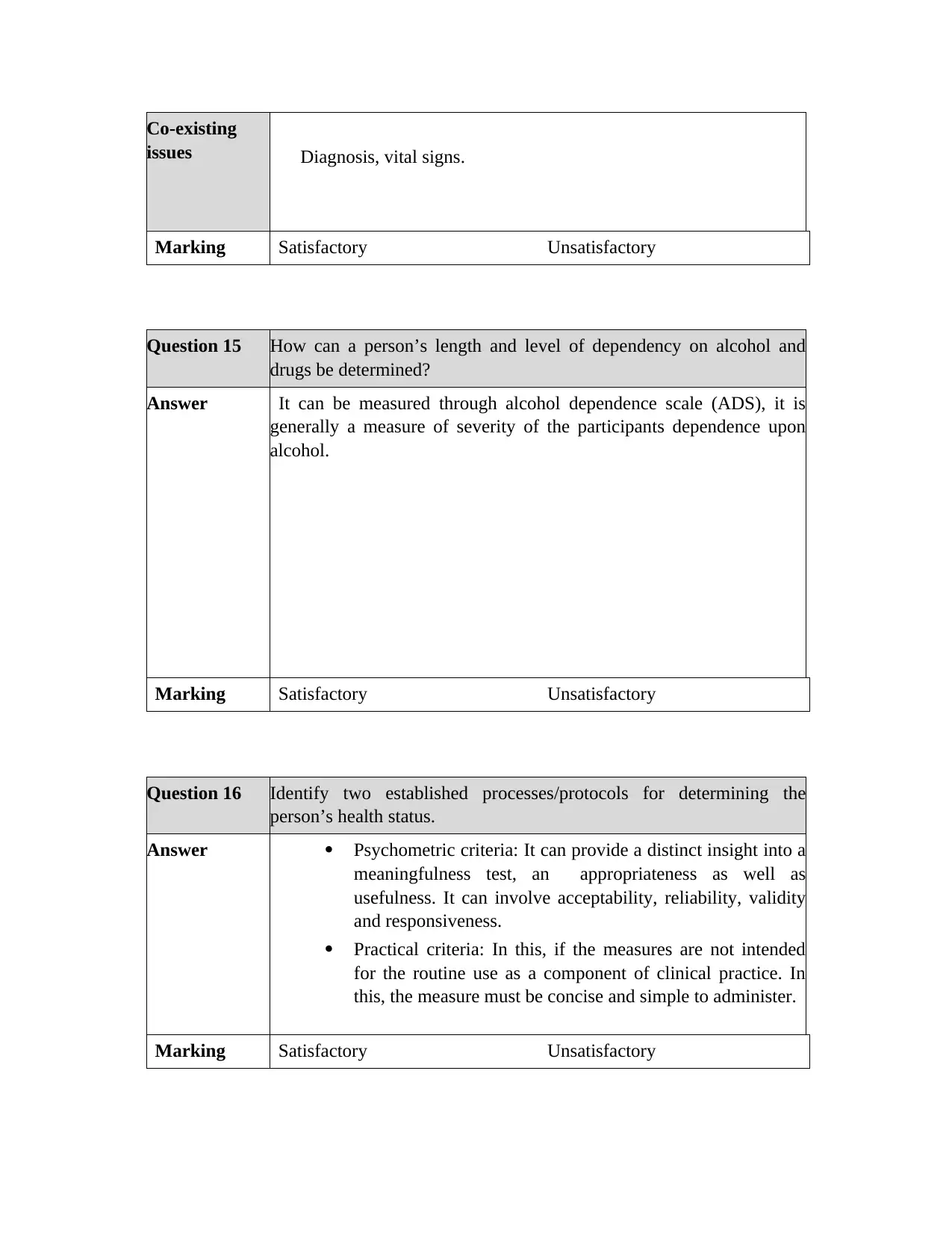
Co-existing
issues Diagnosis, vital signs.
Marking Satisfactory Unsatisfactory
Question 15 How can a person’s length and level of dependency on alcohol and
drugs be determined?
Answer It can be measured through alcohol dependence scale (ADS), it is
generally a measure of severity of the participants dependence upon
alcohol.
Marking Satisfactory Unsatisfactory
Question 16 Identify two established processes/protocols for determining the
person’s health status.
Answer Psychometric criteria: It can provide a distinct insight into a
meaningfulness test, an appropriateness as well as
usefulness. It can involve acceptability, reliability, validity
and responsiveness.
Practical criteria: In this, if the measures are not intended
for the routine use as a component of clinical practice. In
this, the measure must be concise and simple to administer.
Marking Satisfactory Unsatisfactory
issues Diagnosis, vital signs.
Marking Satisfactory Unsatisfactory
Question 15 How can a person’s length and level of dependency on alcohol and
drugs be determined?
Answer It can be measured through alcohol dependence scale (ADS), it is
generally a measure of severity of the participants dependence upon
alcohol.
Marking Satisfactory Unsatisfactory
Question 16 Identify two established processes/protocols for determining the
person’s health status.
Answer Psychometric criteria: It can provide a distinct insight into a
meaningfulness test, an appropriateness as well as
usefulness. It can involve acceptability, reliability, validity
and responsiveness.
Practical criteria: In this, if the measures are not intended
for the routine use as a component of clinical practice. In
this, the measure must be concise and simple to administer.
Marking Satisfactory Unsatisfactory
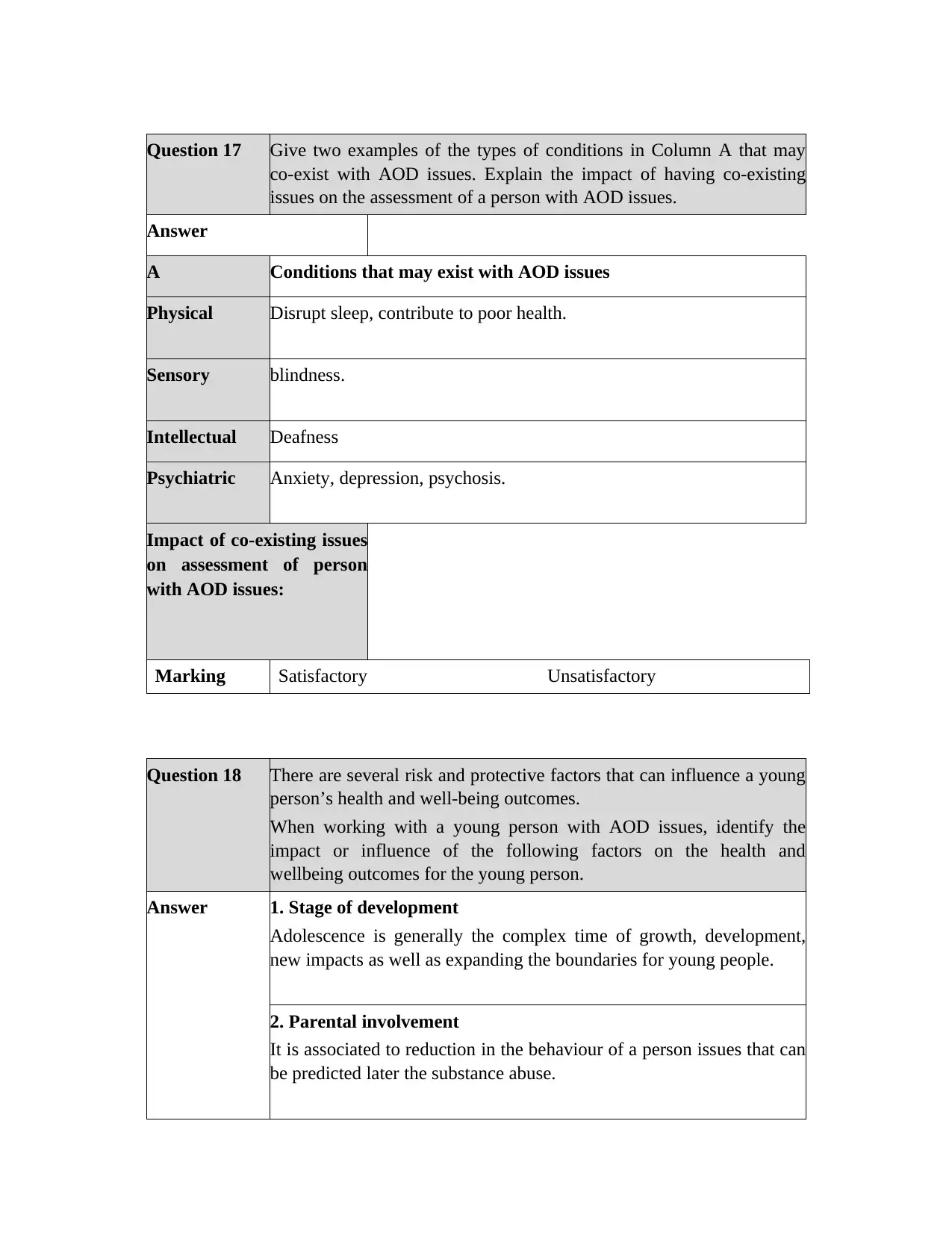
Question 17 Give two examples of the types of conditions in Column A that may
co-exist with AOD issues. Explain the impact of having co-existing
issues on the assessment of a person with AOD issues.
Answer
A Conditions that may exist with AOD issues
Physical Disrupt sleep, contribute to poor health.
Sensory blindness.
Intellectual Deafness
Psychiatric Anxiety, depression, psychosis.
Impact of co-existing issues
on assessment of person
with AOD issues:
Marking Satisfactory Unsatisfactory
Question 18 There are several risk and protective factors that can influence a young
person’s health and well-being outcomes.
When working with a young person with AOD issues, identify the
impact or influence of the following factors on the health and
wellbeing outcomes for the young person.
Answer 1. Stage of development
Adolescence is generally the complex time of growth, development,
new impacts as well as expanding the boundaries for young people.
2. Parental involvement
It is associated to reduction in the behaviour of a person issues that can
be predicted later the substance abuse.
co-exist with AOD issues. Explain the impact of having co-existing
issues on the assessment of a person with AOD issues.
Answer
A Conditions that may exist with AOD issues
Physical Disrupt sleep, contribute to poor health.
Sensory blindness.
Intellectual Deafness
Psychiatric Anxiety, depression, psychosis.
Impact of co-existing issues
on assessment of person
with AOD issues:
Marking Satisfactory Unsatisfactory
Question 18 There are several risk and protective factors that can influence a young
person’s health and well-being outcomes.
When working with a young person with AOD issues, identify the
impact or influence of the following factors on the health and
wellbeing outcomes for the young person.
Answer 1. Stage of development
Adolescence is generally the complex time of growth, development,
new impacts as well as expanding the boundaries for young people.
2. Parental involvement
It is associated to reduction in the behaviour of a person issues that can
be predicted later the substance abuse.
⊘ This is a preview!⊘
Do you want full access?
Subscribe today to unlock all pages.

Trusted by 1+ million students worldwide
1 out of 28
Related Documents
Your All-in-One AI-Powered Toolkit for Academic Success.
+13062052269
info@desklib.com
Available 24*7 on WhatsApp / Email
![[object Object]](/_next/static/media/star-bottom.7253800d.svg)
Unlock your academic potential
Copyright © 2020–2025 A2Z Services. All Rights Reserved. Developed and managed by ZUCOL.





